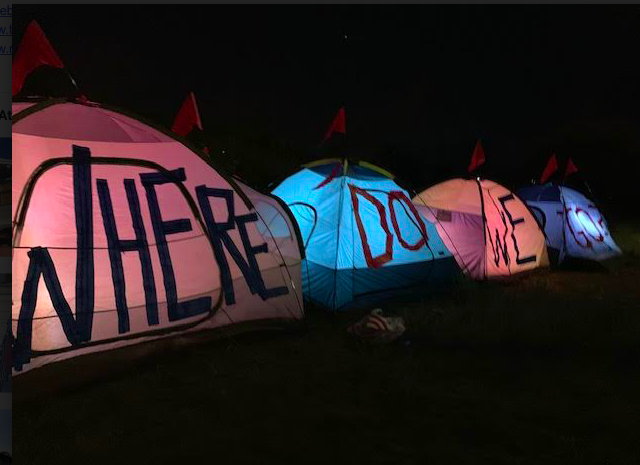The Board of Supes Budget and Finance Committee will consider Wednesday/21 a proposal to mandate “safe sleeping sites” for any unhoused person in the city.
Under the plan by Sup. Rafael Mandelman, the Department of Homelessness and Supportive Housing would have to come up with a plan within 18 months to guarantee that anyone sleeping on the sidewalks or the parks or in buses or anywhere else can have a shelter with functioning toilets and showers – on demand.

But Jennifer Friedenbach, the director of the Coalition on Homelessness, is not a supporter.
In an April 15 oped, she argues that the plan “would cost an outrageous amount of money without ending homelessness for one person.”
The issue here is whether shelter – that is, temporary congregate settings that may include safe campaign sites – ought to be a city goal, or whether the money that SF has (and it’s a lot of money, soon to be more) should go to creating, buying, and preserving permanent affordable and supportive housing.
Friedenbach:
According to San Francisco’s Department of Homelessness and Supportive Housing, the cost of the city’s safe sleep programs over the last year amounts to about $61,000 per tent. This is well over the cost of a private market subsidy with support services for a single household, priced at about $40,000 per year, and over two times the average cost of rent for a one-bedroom apartment in San Francisco, The total price tag of this legislation is $244 million, equal to our pre-pandemic homeless department’s entire budget.
More:
While it would be flawed even in the best of times, this legislation is being discussed at a time when the opportunity is ripe for San Francisco to set ambitious goals for increasing its permanent housing stock, including the creation of 10,000 units authorized by Prop. K and the Mayor’s ambitious Homelessness Recovery Plan for over 2,500 new permanent housing units for homeless people. Between the millions of expected federal relief dollars specifically slated for addressing homelessness, the hundreds of millions of available Prop. C dollars, and the new funds provided by Prop. I, the city has the opportunity to invest in the acquisition and construction of thousands of units. In combination with the over 1,700 people currently in SIP hotels with the guarantee of being moved into housing, this could put a huge dent in the skyrocketing population of unhoused San Franciscans.
For decades, ever since Ronald Reagan stopped funding public housing in cities and cut the social safety net to the point where unemployed and disabled people could no longer afford private housing, homelessness has been a problem in US cities – and most of the solutions have involved shelters.
The idea is the get people off the streets – political leaders say it’s for their own health and safety, but it’s also to clear neighborhoods of tent encampments – and into temporary situations that can, on occasion, lead to permanent housing.
But there isn’t enough affordable permanent housing in the city. There could be a lot more if the city would be more aggressive about using the money we have (and can borrow) to buy hotels that are now empty and will be for years to come. That’s what Friedenbach is saying: Take the money we have from Prop. C, and we will likely get from the federal government under Biden, and use it to buy permanently affordable housing, as fast as we can.
Mandelman told me he disagrees with her position.
“I don’t think we should just leave people who don’t have a permanent housing option to fend for themselves,” he told me. “It’s inhumane for them and irresponsible for the neighborhoods. It would be good not just to create more permanent housing but to manage the needs of people tonight.”
He said the legislation mandates a plan – and if it’s too expensive, the board doesn’t have to fund it. “I’m pretty sure the policy is right,” he said. “San Franciscans don’t want people camping on the streets, but also don’t want people to have to camp.”
For more than 40 years, the city has failed to address homelessness for a long list of reasons (including a failure to prevent evictions and a profound failure to link new office development to affordable housing). Almost all of the mayors since Dianne Feinstein have in one way or another used shelters as a solution.
And that’s never worked.
The city – and the state – has also failed, fundamentally, to put up the money for mental-health treatment. In California, prisons and jails became the answer to mental health. That was, and is, a massive and inexcusable human-rights failure.
So the issue before the board is: Do we spend money now to get people off the streets, into temporary situations that don’t always lead to permanent housing? Do we put that money instead into long-term solutions?
Do we worry about tonight – or tomorrow?
The hearing begins at 9am.







